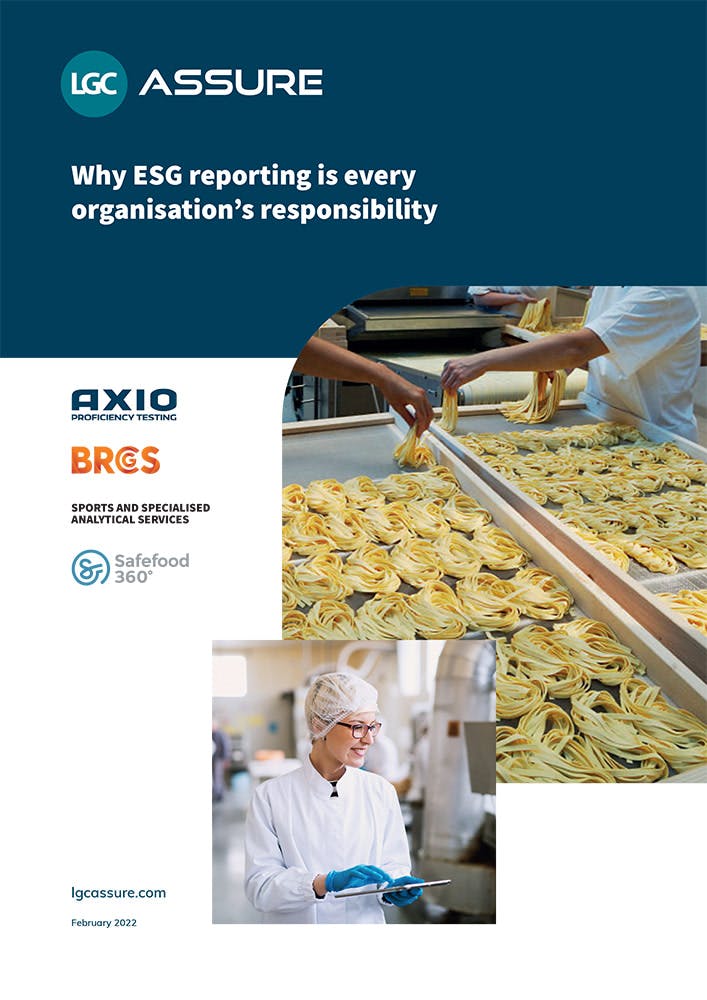ESG is here to stay. How can food manufacturers demonstrate their credibility?
Environmental, Social and Governance (ESG) issues are becoming increasingly important considerations for the food and drink manufacturers. But how can you ensure the credibility of sustainability claims across supply chains?
23 June 2022

Share this article
Standardisation and certification boosts sustainability credentials for food and drink manufacturers
Environmental, Social and Governance (ESG) issues are increasingly important considerations for many companies. Whether initiatives stem from stakeholder demands or from internal awareness of the risks and rewards involved, there’s no denying that the ESG agenda has the potential to underpin immense value in organisations around the world.
The Wall Street Journal reports that ESG programmes are driving investment in food tech/waste reduction start-ups in the US. But there are downsides too, as businesses scrabble to get up to speed with ESG issues without the credibility they need to sustain those efforts – a situation known as ‘greenwashing’.
Retailers lack confidence in ESG claims
Recent research from UK law firm TLT found that only 16% of retailers (and just 10% of grocery businesses) are “very confident” that they will meet the Competition and Market Authority’s (CMA’s) expectations when it conducts a full review of green claims this year.
In advance of this review, 62% of retailers say they are under pressure to make their position on sustainability more visible and 59% are becoming more vocal about their sustainability credentials. However, 52% of respondents admit it’s impossible for retailers to know if they’re really doing enough to say they’re sustainable.
How a standardised approach to ESG data reporting helps
LGC Assure believes there’s a need for a standardised approach to address the complexity across supply chains. This should be tailored around the ability of ESG initiatives to deliver:
A multi-dimensional view of suppliers on a single platform – for oversight of compliance and performance;
Programmes oriented towards meaningful and verified improvement (rather than a simple ESG rating);
Best practices tailored to specific products and/or sectors;
Continuous ‘learning’ built into the platform, so that suppliers are constantly measuring themselves against what ‘good’ looks like in real time;
On-site verification of the data to check the claims made.
The business value of ESG initiatives
Consultancy firm McKinsey identifies five ways a strong ESG proposition creates business value:
Top-line growth through improved reputation
Decreased costs of lower energy consumption
Reduced regulatory and legal interventions
Increased productivity from motivated employees
Enhanced investment returns from optimised assets
So the business benefits of addressing ESG issues are clear. But initiatives can’t be implemented with an ‘afterthought’ approach.
91% of consumers say they will research a company’s practice on addressing climate change, diversity and inclusion (D&I), ethical practices and sustainable initiatives before they purchase from them
Beware the power of public opinion
It’s important to be aware of the growing scrutiny of consumers and governments alike, and the impact that may have on the credibility of sustainability claims across supply chains.
In its People, Planet, Data report, data analytics company Exasol sets out the results of a survey of consumers and corporate social responsibility (CSR) decision-makers that it conducted last year. Its research demonstrates the power of consumer opinion – and the potential impact on reputational risk for business in all sectors:
91% of consumers say they will research a company’s practice on addressing climate change, diversity and inclusion (D&I), ethical practices and sustainable initiatives before they purchase from them.
86% of consumers say they’ve changed their mind about purchasing something from a company because they felt they didn’t do enough about climate change.
79% of consumers may stop buying from brands they believe just run CSR and ESG as a box-ticking exercise.
There’s no doubt that the ESG agenda is here to stay. How businesses choose to respond to it may well prove critical to their future success.

Make sure you know everything about ESG
In this LGC ASSURE whitepaper we look at what’s driving companies to disclose detailed information about their emissions, use of resources and labour practices, the implications for supply chains, and solutions for small and medium sized enterprises.
Prepare your business for ESG reportingShare this article